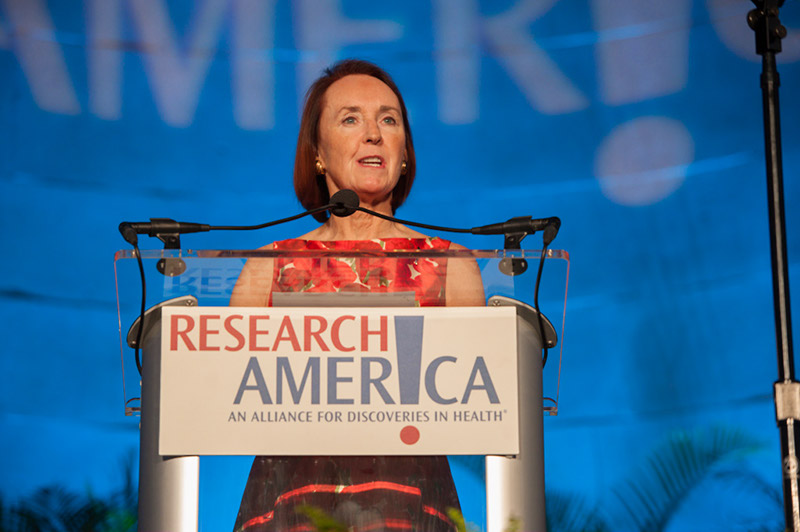Nudging the Nudge-able

 Dear Research Advocate,
Dear Research Advocate,
For the first time since 1975, the Gallup poll has asked respondents about their confidence in science as an institution. Although confidence in science is down from 70% to 64% since 1975, science remains one of our country’s most trusted institutions, behind only small businesses and the military. (Gallup’s findings are in line with results from our own commissioned survey earlier this year.) A breakdown by political affiliation showed a large gap between parties. It’s worth noting that in 1975, Republicans, Democrats and independents all showed similarly strong confidence (~70%) in science. Working towards confidence in science as part of our national identity is high on our agenda; I hope it is on yours as well.
In sync with Gallup’s findings, the Annenberg Public Policy Center Science Knowledge survey shows persistent political division regarding COVID-19 and vaccine distrust. Encouragingly, the survey shows a broad trend of “growing public confidence in both the safety and effectiveness of vaccines to prevent COVID-19,” as compared with prior surveys from April 2021 and August 2020.
Science is clearly of interest to pollsters right now. A new Axios-Ipsos survey found that among the 30% of people who are unvaccinated in the U.S., approximately half say they are “not at all likely” to change their mind. For the half who said they may be convincible, getting the vaccine at their regular doctor’s office had the highest receptivity. “From a public health standpoint they’ve got to figure out how you nudge the nudge-able,” said Cliff Young, president of Ipsos U.S. Public Affairs.
On the Hill: Work on FY22 appropriations continues in Congress, with the House expected to vote on a “minibus” containing the Labor-H and Ag-FDA appropriations bills next week. We sent a letter today to Senate Appropriations leadership, thanking them for their longstanding support, and encouraging them to prioritize NIH, CDC, AHRQ, NSF and FDA as they weigh funding decisions.
Senate Appropriations Committee Vice Chairman Richard Shelby (R-AL) has said appropriators in his chamber may mark up three FY22 spending bills before the August recess. Use this editable email to urge your Senators to support increased funding levels for our nation’s health, medical, and scientific research agencies in FY22. AAAS has created and is maintaining a terrific dashboard to compare White House, House and Senate FY22 spending proposals for science and technology.
ARPA-H: NIH and OSTP are holding listening sessions for patient advocacy groups, researchers from academia and industry, scientific societies, and other stakeholders to learn more about and help shape the Advanced Research Projects Agency for Health (ARPA-H). We encourage you to participate. Visit the NIH events website for more details and registration information.
Communicating Basic Science: The Kavli Foundation, in conjunction with the Department of Energy’s Office of Science, will host a free, virtual conference for scientists and professionals to explore “the why, what and how of the relationship between the public and basic science.” Register for the inaugural SciPEP conference, July 27-28.
Rare Disease Advocacy: Today marks the conclusion of the Virtual Rare Disease Week on Capitol Hill organized by the EveryLife Foundation for Rare Diseases, bringing together rare disease advocates from across the country to share their personal stories with members of congress and urge support for more research.
Registration is open for another important opportunity, the National Organization for Rare Disorders (NORD) Rare Summit multi-stakeholder conference, being held in October.
We salute these efforts to bring attention to the staggering unmet medical needs of those with rare diseases. There are approximately 7,000 rare diseases but only 5% with FDA-approved treatments, according to National Center for Advancing Translational Sciences (NCATS) Acting Director Dr. Joni L. Rutter, who spoke to our alliance members last week. NCATS, along with the National Human Genome Research Institute (NHGRI) co-funds the Genetic and Rare Diseases Information Center (GARD), which provides individuals and families impacted by genetic and rare diseases access to information and care. Explore our fact sheet on rare diseases.
Alliance Member Meeting Recap: We were joined by Tannaz Rasouli, Senior Director, Public Policy & Strategic Outreach, Association of American Medical Colleges (AAMC), for a truly insightful state of play on the funding and legislative dynamics in Congress bearing on medical and health research. Watch her terrific presentation.
Upcoming Alliance Member Meetings: On Wednesday, July 28, at 1 p.m. ET, Jessica Drislane, CEO of OpenScholar LLC, and Jaime S. Rubin, PhD, Vice Chair for Investigator Development and Professor of Medical Sciences at Columbia University, will share strategies for securing grant funding. Register to join.
On Thursday, July 29, at 11 a.m. ET, join us for a conversation about misinformation with researcher Brian Southwell, PhD, Senior Director, Science in the Public Sphere, RTI International. Registration details to come.
Save the Date for Forum: Please hold Sept. 13-15 on your calendar for one of our signature events, the 2021 National Health Research Forum, “Straight Talk: Fighting Health Threats Faster.” Watch this space for more details.
Stay well, stay safe, and stay connected.
Sincerely,
Mary Woolley




